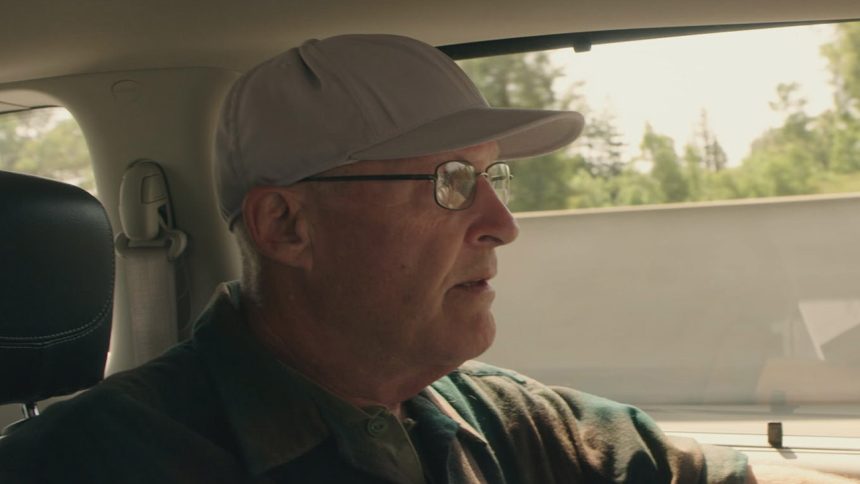How ‘The Mortician’ Director Landed That Stunning Finale Confession
The ending to HBO’s The Mortician was quite grim. If we’re being (very) generous to the docuseries’ titular subject David Sconce, it was also perhaps a bit vague. The Hollywood Reporter was not about to let filmmaker Joshua Rofé just fade to black, however — not without getting in some questions of our own.
Rofé (Lorena, Sasquatch) waited two-and-a-half years for Sconce, a crematorium operator convicted of a graveyard full of crimes (improper handling of human remains, conducting cremations improperly, murder conspiracy) to be freed from prison, and thus become even theoretically available for an on-camera interview, which played out on the three-part docuseries that concluded Sunday night.
By the time Sconce was paroled, Rofé had “already spent seven figures of HBO’s money” making The Mortician, he tells THR, adding that it was “a gamble worth taking.”
It’s pretty easy to gamble with someone else’s money. Worst-case scenario, Rofé says, he’d be “blacklisted at HBO.” But Rofé got his man.
You Might Also Like
Rofé picked Sconce up from prison and within “three minutes” of getting in the car, Sconce started singing like a bird, Rofé says. Rofé is just as talkative; read our Q&A below.
***
The Mortician had a TheJinx-like ending — another HBO docuseries with an apparent murder confession in its final moments. Did you immediately think of the comparison?
I could not have imagined that a moment like that would occur. And in the moment as it’s occurring, I’m not thinking about anything other than, “Oh, wow. This guy really wants to get me alone, away from the cameras, and he wants to tell me something that is clearly extremely nefarious.”
I don’t want to comment on the allegation of what it seems he’s implying. It’s clear— it’s very clear to the audience, right? But I was just like, “Holy fuck, this guy really thinks that I’m then gonna just walk with this secret alongside him.” It was so chilling, and I needed to make clear that I’m not in the business of keeping secrets about crimes.
When the moment concludes, I’m completely adrenalized. Quickly, my eyes dart to my DP Ronan Killeen and to my producing partner, Steven Berger. Everybody’s keeping very calm, but we all understand what just happened. We took a break after that moment. Actually, I went to the bathroom, quite literally, to just go have privacy. I went in there and I needed to take a breath. I texted my editors, and I said, “I just got our ending.”
One thing I would encourage viewers to do: watch that ending three or four times. Just keep rewinding it. The amount of nuance in him, in those moments — you’ll see something new every time. That’s where the chilling part is — the nuance. It’s the way he cocks his head. It’s what he does with his eyes. It’s the way he changes his voice. It’s where the laugh comes in. It’s unbelievable.
OK, so you don’t want to comment on what Sconce is implying, but if I am personally interpreting it to be an apparent murder confession…
It’s accurate. [Pauses] You know, the one thing — and maybe this will be helpful to you — when I first told the execs at HBO what happened, the way I categorized it was, and I think this is really accurate: “With a wink and a nod, he’s making these admissions.”
Are you bummed you didn’t get a full-on, outright, 100 percent clear, admissible-in-court-type confession?
If you were to write a thriller, if you were to write a mystery, where your protagonist — your villain, whatever you’d like to call them — has a moment at the end where they suddenly, truly reveal all after denying so much and getting away with effectively the most egregious crimes that they’re accused of committing, you would script it like this. You wouldn’t have them say anything definitively because now there’s nothing to talk about — there’s nothing to mull over.
It would be Gary Oldman playing this role and with a wink and a nod, sending a chill down your spine. Then afterwards, you’re at dinner with friends, or you’re talking to people at work the next day, and you’re dissecting the intention he had and the nuance. As a person who is film-obsessed, when I’m sitting there and experiencing this in real life, and then two-to-three months later, talking to the [anonymous former Sconce employee] in shadow, and then he also says the number “three” in response to the question I asked about how many people he thinks David might have had killed — you’re seeing The Usual Suspects and the way the pieces come together at the end. It was stunning. Stunning.
Given the watercooler ending, are you thrilled this film went to HBO — one of the few destinations that still has weekly time slots — as opposed to Netflix or another bingeable platform?
First of all, the gift we were given by being HBO’s Sunday night 9 p.m. show is just unbelievable. It sends a very clear message to the audience right off the bat. The audience is being told by an entity that they trust, “This is worth your time.” So people give you a chance. And I know that we’ve been doing quite well [in viewership], thankfully, and it’s continuing to build, which has been such a thrill.
Among my collaborators, we keep talking about how The Mortician coming out weekly has been crucial. There’s a lot to digest [in the series]; you should only have one a week. Frankly if it was just binged, it wouldn’t feel special. And my experiences prior to this had been at streamers, and I had amazing experiences.
This story begged for the dramatic delay that is built in. We also felt that the most extraordinary moment in the whole series is the ending. So we knew that, thankfully, we were going to deliver for an audience who was going to be loyal and supportive and keep showing up. We knew we would deliver for them. So that was exciting.
Was it frustrating for you that the DP needed to reload the camera at that crucial time?
It wasn’t because I couldn’t have seen anything coming, and the truth is that happens all the time. The DP will only do that when they have to. And he saw a good story. He’s not just operating the camera and keeping an eye on the lighting that he set up — he’s listening. He’s an extraordinary listener. So what he has seen is that a compelling story is revving up and there’s four or so minutes left on the card, and this guy might go on for another eight minutes. So if he cuts in later, he could be killing a super dramatic moment. So he knows instinctively, “This could really be going somewhere.” Later, I said, “Do you realize how unbelievable it is that you just happen to cut it at that moment?” None of this is by design. You just cannot manufacture it.
The day we did that interview, Sconce had been in the car with us the whole previous day, driving from Sacramento to L.A., and he got comfortable with us. I think he was still in a particular mindset. He was fresh out of prison, so perhaps it’s like, “I’m still with the guys just kind of talking shit. Gotta impress the guys, show them you’re the baddest motherfucker here.” That kind of thing. He was in a particular mind state, and everything came together and lightning struck.
Do you think the camera situation hindered the moment or helped it?
I think it helps it.
Because it builds drama?
Yeah.So we’re talking today [on Friday before the episode airs Sunday]. [Friday night], we’re having a sneak peek screening in a room with friends and family, who are all going to be sworn to secrecy for 48 hours. We know where they all live, so it’s OK (laughs). I was telling my producing partner Steven, “You know what I’m so excited to see is the audience sort of shift in their seat.” It’s what I’ve anticipated when I’ve shown this to — even just one-on-one — various people. In that moment, something unexpected is happening. The viewer is knocked off their axis.
You’re in a documentary, the fourth wall has not been broken. And now, you’re behind the scenes. It’s just, “What is happening?” And before you even have time to process — it’s all happening in split seconds — it’s making you uneasy. It’s creating a new kind of drama you haven’t yet seen before, and then it obviously goes to this unfathomable place. So I really think it helps; it creates this whole energy that then snowballs.
Any regrets about not hearing Sconce out in private (as he offered) in terms of a moral, ethical obligation to society?
I’m a filmmaker. I’m not law enforcement. As far as I’m concerned, we fulfilled our societal obligation — and then some — by putting this doc series together. This man — who he is, what he is — is on full display for millions to see. And if there is something that is worthy of being looked into by law enforcement, they will proceed.
***
The Mortician is now streaming on HBO Max. Read THR’s first take on the ending.







